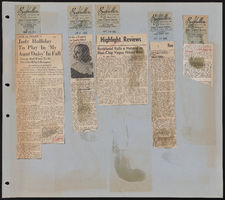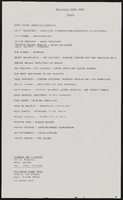Search the Special Collections and Archives Portal
Search Results
Marienne Shaver oral history interview
Identifier
Abstract
Oral history interview with Marienne Shaver conducted by her granddaughter, Alice Penwell, on March 21, 1977 for the Ralph Roske Oral History Project on Early Las Vegas. In this interview, Shaver describes visiting and moving to Reno, Nevada from Michigan and later staying in Nevada to teach. Shaver talks about moving to Las Vegas, Nevada and being involved in the local girl scouts organization, church, and women's club. Lastly, Shaver discusses the growth of Las Vegas.
Archival Collection
Paul A. Beach oral history interview
Identifier
Abstract
Oral history interview with Paul A. Beach conducted by William Gekakis on February 17, 1976 for the Ralph Roske Oral History Project on Early Las Vegas. During this interview, Beach discusses housing, physical boundaries of the city of Las Vegas, Nevada, the airport, church, and transportation. Beach also discusses tourist recreation, the economy, Nellis Air Force Base, the Las Vegas Strip, industries, presidential visits, the Korean War, atomic tests, and the educational system.
Archival Collection
Laura Gunning oral history interview
Identifier
Abstract
Oral history interview with Laura Gunning conducted by Mike Martinez on March 5, 1981 for the Ralph Roske Oral History Project on Early Las Vegas. Gunning discusses her life in Las Vegas, Nevada. Gunning first talks about her family background, her church membership, education, and the minimum wage. She also talks about the Las Vegas Strip, the first businesses and markets in Las Vegas, change in climate, and family trips.
Archival Collection
Polly F. Lilly oral history interview
Identifier
Abstract
Oral history interview with Polly F. Lilly conducted by Connie L. Patterson on March 26, 1976 for the Ralph Roske Oral History Project. In this interview, Lilly discusses a range of topics, from building a Catholic church in early Las Vegas, Nevada, to the nearby nuclear weapons tests. She also describes witnessing a confrontation between Senator Joseph McCarthy and Hank Greenspun on stage at the now demolished War Memorial Building in Las Vegas, Nevada.
Archival Collection
Janet Adams oral history interview
Identifier
Abstract
Oral history interview with Janet Adams conducted by Glodene Sawyer on October 13, 1972 for the Ralph Roske Oral History Project on Early Las Vegas. Adams (born in Scotland) discusses her move to Las Vegas, Nevada from California with her husband. Adams also briefly discusses early churches, the above-ground atomic testing, President Kennedy’s visit, and her enjoyment in recreational fishing.
Archival Collection
Rampton, Renée Marchant, 1935-
Renée grew up in a family of fifteen children. In 1956 she married musician Roger Rampton, a successful percussionist. They soon moved to Las Vegas where Roger performed on the Strip. She remained active in her Mormon faith and the Church's music ministry. When the Clark County School District was going to cut their music programs in the early 1970s, she became a vocal community opponent. In the 1970s the Mormon Church opposed the Equal Rights Amendment.
Person
Rolling footage of Las Vegas, Nevada locations (non-strip related): video, 1988 March
Level of Description
Scope and Contents
Opens with wide desert landscape and close-ups of plants taken from different angles; cuts to Meadows Mall parking lot and sign, car begins driving and continutes to roll footage as it drives through the city. B-roll shots of the freeway, buildings on the side of the freeway, and then the camera operator gets into a helicopter at McCarran and the footage switches briefly to aerial view of the airport, then back to rolling ground footage. Views include local branch library, Fashion Show mall, strip malls, a parks, Nevada State Museum, residential streets, churches, and East Las Vegas Senior Center. Original media 1 Inch SMPTE Type B, color, aspect ratio 4 x 3, frame size 720 x 486.
Archival Collection
Collection Name: The Production Company Audiovisual Collection
Box/Folder: Digital File 00
Archival Component
Emily Persaud-Zamora oral history interview
Identifier
Abstract
Oral history interview with Emily Persaud-Zamora conducted by Cecilia Winchell and Stefani Evans on January 17, 2023 for the Reflections: the Las Vegas Asian American and Pacific Islander Oral History Project. In this interview, Persaud-Zamora remembers growing up in Queens, New York and being exposed to numerous cultures and ethnicities. Though her parents separated when she was two, Persaud-Zamora maintained a steady relationship with both. Her mother was originally from Brazil and worked as a chef, primarily for private homes. Her father was an immigrant from Guyana, with roots in India, and did catering for large events and eventually moved to Georgia. Growing up she recalls being between two worlds, never feeling quite Brazilian enough or Asian enough, but still being connected to her Hindu roots in various ways. When she was fifteen, Persaud-Zamora and her mother moved to Las Vegas, Nevada, where she continued high school and describes the cultural differences between the two places she had lived. After high school, she received a degree in political science and ended up working in public policy. Her current position at Silver State Voices involves work with many different organizations across Nevada to advocate for progressive issues and underrepresented communities. Throughout the interview, Persaud-Zamora touches on a number of other issues, including her religion, traditions, and family.
Archival Collection


